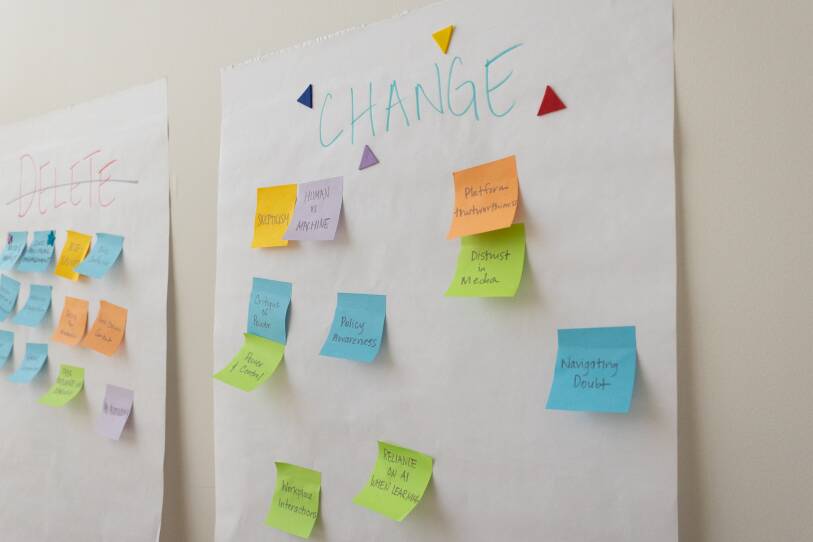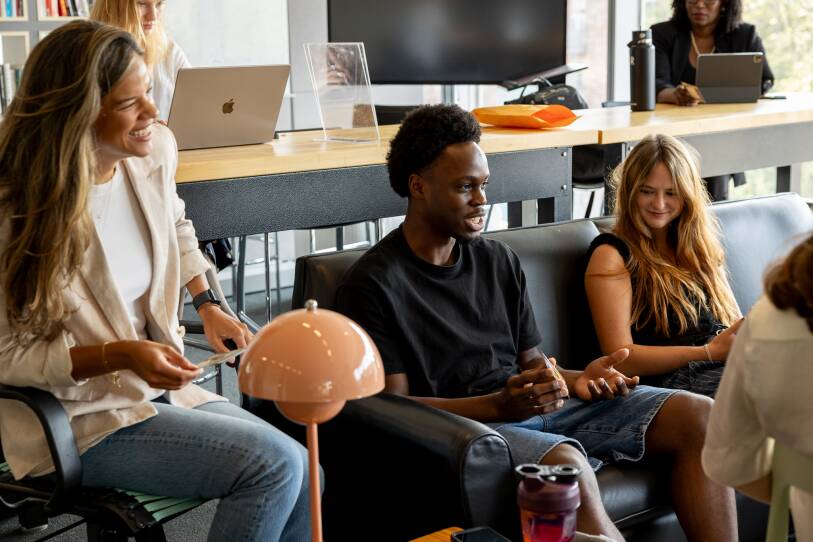FRONTLINE is no stranger to ambitious undertakings. For 40+ years, the program’s award-winning journalism has brought audiences across the globe in pursuit of the most pressing stories about the most urgent questions.
Now, two years into the Youth Civic Voices Initiative, a collaborative fellowship with MIT’s Center for Constructive Communication (CCC) and the non-profit Cortico, FRONTLINE is breaking new ground at the intersection of journalistic storytelling, AI learning, and civic dialogue. A paid fellowship for a small collection of Boston-based students aged 16-21, the initiative brings participants together under the roof of the MIT Media Lab for six weeks to foster productive conversations around emerging technologies and how they’ll impact the world.
The roots of this initiative go back some 14 years, when Raney Aronson-Rath, FRONTLINE’s editor-in-chief and executive producer, participated in a residency at the Media Lab. “It was incredibly important for me,” she says. “I spent a year [at MIT] amongst people who had such different backgrounds and perspectives on the world and media. In those sessions and conversations, I realized how strong storytelling and technological expertise can be such a powerful combination.”

Architected by Aronson-Rath and MIT professor Deb Roy, director of the CCC and co-founder, CEO, and chair of Cortico, this summer’s curriculum places a special emphasis on artificial intelligence (AI) and the long shadow it already casts in the fellows’ lives — from their education and career plans to their relationships and beyond. “We want to know how kids are thinking about AI,” Aronson-Rath continues. “What are their concerns, their fears, but also, what are the possibilities?”
In line with the multidisciplinary bent of the Media Lab and the initiative’s goal of promoting meaningful dialogue, the fellows come from a wide range of backgrounds and fields of study, including computer science, business, finance, economics, as well as English and journalism. Moreover, it was imperative that the program be a paid fellowship, says Aronson-Rath. “If you don’t pay people for their time, you only get people who can afford not to be paid. Our goal was to have a group of fellows that was socioeconomically diverse.”
“In the last meeting I dropped in,” says Aronson-Rath, “one of the fellows raised an important question about AI exacerbating global inequality. You could see the gears turning, how hard she was thinking about socioeconomic divides deepening by virtue of who has access to technology and who doesn’t, who has jobs and who doesn’t. That’s the kind of important conversations happening in the initiative.”
This fellowship helped me practice storytelling and prioritize the human element during difficult conversations. We fostered an environment of compassion amid often uncomfortable disagreement. The fellowship has influenced me to use discussion frameworks to accelerate learning, trust, and growth.Erin Birdsong, Youth Civic Voices Initiative Fellow
“We wanted young people who were considering it from all different angles,” she continues. “The conversations are structured in such a way that, even when there’s deep disagreement, everyone’s ideas are treated with respect.”
“FRONTLINE is the perfect partner for this initiative,” says Jessica Massa, showrunner and senior producer of short docs for FRONTLINE, “because we’re never looking for clickbait, but rather, always trying to tell the fullest, most complex version of the story.”

Every Wednesday, the fellows come to the Media Lab in Cambridge having watched a short-to-medium length piece of journalism on a given topic, like AI in business. From there, an MIT researcher walks them through a cutting-edge piece of tech, such as an AI tool that helps them build a conversation guide around the topic. The students talk through the topic of the day using the conversation guide to better understand the anxieties, motivations, and hopes that accompany the issue.
Then comes lunch, followed by a guest speaker who specializes in the issue at hand. Afterward, the students record an audio diary of their experience, as well as their opinions on the subject. Finally, on their off-days, they meet remotely with a group of young people they’ve gathered to lead a discussion, leveraging the conversation guide to gain a better understanding of their group’s feelings on the week’s topic.
During these six weeks, I learned that AI should not be used for everything, but just to streamline mundane tasks so that we can focus on more meaningful, human-driven work. I plan to build on everything I learned , ensuring I use AI only when absolutely necessary, leveraging its strengths while never allowing it to overshadow areas where I can grow.Prahlad Peri, Youth Civic Voices Initiative Fellow
“We’re not the only journalism outlet aiming to say important things about AI,” says Massa, “but not many others get the benefit of this feedback loop with our audience and the stories we’re developing. It’s so informative, sitting with young people week in, week out, in this MIT setting as they share their thoughts, fears, and excitement around AI.”
For Massa, working with the students and seeing them connect as friends and colleagues has been nothing short of amazing. “On the first day, most of them had never met each other. But going through this experience together — talking through these really intricate, curated conversations and sessions — they’ve become so comfortable with each other. Even by the second week, it was completely different how responsive they were to each other in conversation. Not only are they incredibly thoughtful and intelligent,” says Massa, “they all really want to be there.”

With this program, FRONTLINE continues its bottom-up approach to journalism. “We’re interested in making work that reflects our audience, and, in the manner of engaged journalism, brings their voices and concerns into it before we’re even making the work,” adds Massa.
Success for this initiative will take a number of different shapes. First, says Massa, is for the fellows to leave with a meaningful experience that stays with them and opens them up to new ideas, friendships, and collaborations.
For FRONTLINE, the main goal is to craft stories about AI informed by the conversations these young people have had. “If you’re telling stories about AI without capturing what it will mean for this generation, you’re missing the mark. They are the generation for whom every area of their lives might be touched by this technology,” Massa says.
I walk away transformed, with a clearer sense of how to connect with others and engage in difficult conversations in ways that bring about constructive, meaningful conclusions.Soliel Hayles, Youth Civic Voices Initiative Fellow
Long-term, MIT wants to bring the initiative to its second phase — developing templates and partnering with libraries to facilitate these conversations across the country. With the assistance of AI tools developed at MIT, the idea is that these sessions could travel, sparking important dialogue on a national scale.
“I care so much about this fellowship,” says Aronson-Rath. “When you’re in a structured environment with young people, it’s incredible what you can learn about your own storytelling, how your journalism comes across. The bigger purpose is that — and it’s truly why I do this work every single day — I want to inspire conversation and education, and for people to think hard and have their opinions change. It’s just been extraordinary seeing these kids model that. Every time I walk into that room, I leave feeling inspired, having learned something I’ve never thought of before.”

Learn more about the Youth Civic Voices Initiative, as well as MIT’s Center for Constructive Communication.
Catch up on recent FRONTLINE episodes through the PBS app or on the series YouTube channel.



